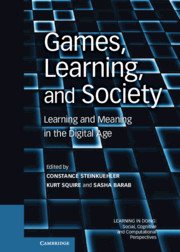Book contents
- Frontmatter
- Contents
- Contributors
- Series Foreword
- Foreword
- Acknowledgments
- Section I Games as Designed Experience
- Section II Games as Emergent Culture
- 10 Introduction to Section II
- 11 Nurturing Affinity Spaces and Game-Based Learning
- 12 Apprenticeship in Massively Multiplayer Online Games
- 13 Theorycrafting
- 14 Culture and Community in a Virtual World for Young Children
- 15 Culture versus Architecture
- 16 Participatory Media Spaces
- Section III Games as Twenty-First-Century Curriculum
- Index
- References
11 - Nurturing Affinity Spaces and Game-Based Learning
Published online by Cambridge University Press: 05 August 2012
- Frontmatter
- Contents
- Contributors
- Series Foreword
- Foreword
- Acknowledgments
- Section I Games as Designed Experience
- Section II Games as Emergent Culture
- 10 Introduction to Section II
- 11 Nurturing Affinity Spaces and Game-Based Learning
- 12 Apprenticeship in Massively Multiplayer Online Games
- 13 Theorycrafting
- 14 Culture and Community in a Virtual World for Young Children
- 15 Culture versus Architecture
- 16 Participatory Media Spaces
- Section III Games as Twenty-First-Century Curriculum
- Index
- References
Summary
In this chapter we will argue that to understand how gaming supports learning, as well as to design games for educational purposes, educators and scholars must think beyond elements of the game software to the social practices, or metagame, that take place within and around games. Based on studies of fan sites associated with the popular computer game The Sims, we identify features of what we call nurturing affinity spaces that are particularly supportive of learning and contrast these features with how schools are typically organized. How such spaces are developed and sustained remains a central question for future research on games and learning, and we conclude by identifying key areas for further investigation.
Games and Learning
Those of us who have made the claim that games are good for learning have meant, of course, that well-designed games are good for learning, not poorly designed ones. While an empirical enterprise is under way to test whether and how games are good for learning, too often these studies do not first ensure that they are assessing games that are well designed.
- Type
- Chapter
- Information
- Games, Learning, and SocietyLearning and Meaning in the Digital Age, pp. 129 - 153Publisher: Cambridge University PressPrint publication year: 2012
References
- 63
- Cited by

